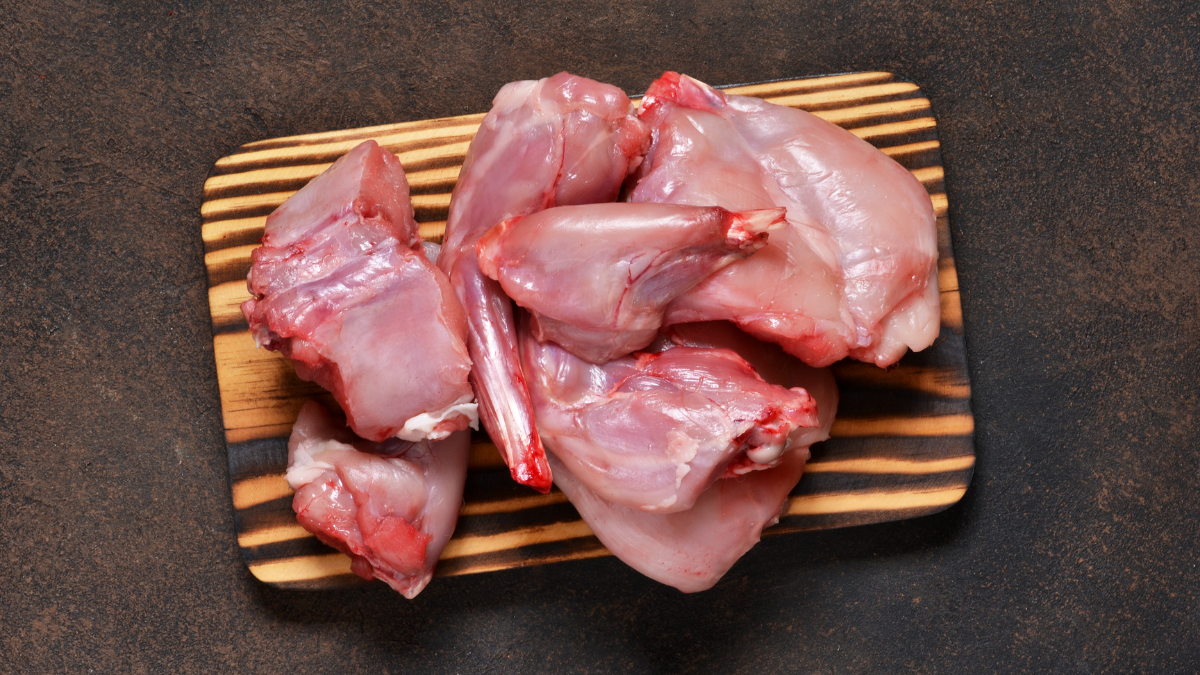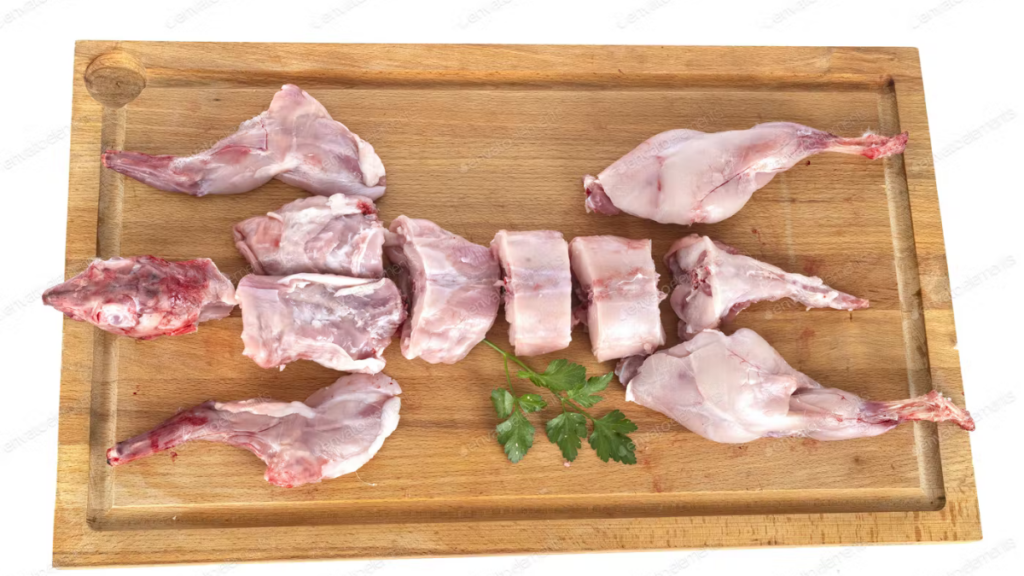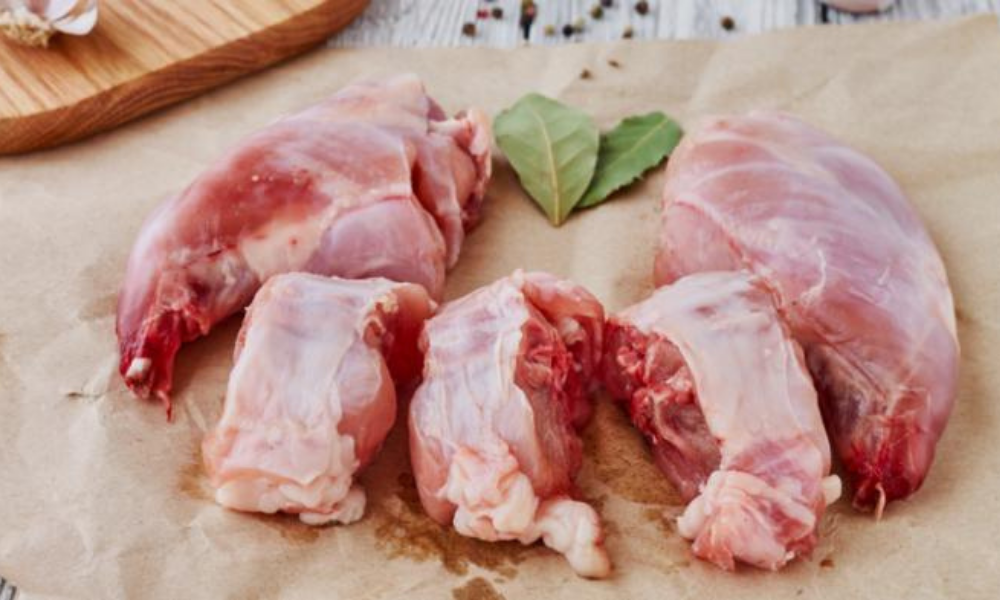The nutritional value of the food varies depending on the type of rabbit meat used and how it is prepared. One of the most efficient ways of learning about a food’s nutrition is to compare it to what we already know. In this situation, we compare rabbit meat to chicken, the most common bird flesh. This article will cover the nutrition facts for wild, stewed rabbit meat.
We can observe that rabbit meat has a higher concentration of most minerals than chicken meat, except for salt. It also has a lot of vitamin B12 and vitamin E, whereas chicken has a lot of B complex vitamins and vitamins A and K. Its meat is also higher in protein and lower in fat than chicken meat.
Rabbit Meat Nutrition Facts
Here’s a table for Rabbit Meat Nutrition Facts for a serving size of 100 grams:
| Nutrient | Amount Per Serving | % Daily Value* |
| Calories | 198 | 10% |
| Total Fat | 11.5 g | 15% |
| Saturated Fat | 3.5 g | 18% |
| Cholesterol | 109 mg | 36% |
| Sodium | 70 mg | 3% |
| Total Carbohydrate | 0 g | 0% |
| Dietary Fiber | 0 g | 0% |
| Sugars | 0 g | – |
| Protein | 21 g | 42% |
| Vitamin D | 0 mcg | 0% |
| Calcium | 23 mg | 2% |
| Iron | 3.5 mg | 19% |
| Potassium | 292 mg | 6% |
Note: *Percent Daily Values are based on a 2,000-calorie diet. Your daily values may be higher or lower depending on your calorie needs.
Rabbit Meat’s Health Benefits
Selenium is a mineral that can be beneficial to our diets. Selenium is a mineral that our bodies utilize to produce antioxidants that can help protect us from malignancies of the stomach, lungs, prostate, and skin.
It can also help protect your arteries from hardening. While red meat has been linked to an increased risk of colon, rectum, and gastric cancer, white meat is not as dangerous. You don’t have to worry about these types of cancer with rabbits because it’s white meat.
Proteins
Regarding protein quality, tryptophan has the highest concentration of all the essential amino acids in rabbit meat, while phenylalanine has the lowest. Compared to beef and chicken, rabbit meat contains much more vitamin B12, making it a good alternative for persons with vitamin B12 deficits.
It also contains a lot of vitamin E. Rabbit meat, like other meats, lacks a significant amount of carbs. Except for B12, it has a lesser B complex vitamin content than other meats, but it is still a good source of pyridoxine (B6) and niacin (B3). There is no vitamin A, vitamin D, or vitamin C in rabbit meat.
Minerals
In all varieties of meat, rabbit meat contains the highest iron content, and it has more calcium, potassium, and magnesium than beef and chicken.
Phosphorus, copper, zinc, and choline are abundant in rabbit flesh. Another benefit of rabbit meat is its low salt content, making it an excellent choice for people with high blood pressure.
During Pregnancy
Poultry rabbit is recommended during pregnancy because lean meats benefit the fetus’s expected growth, and rabbit meat is a good source of B12 vitamins.
Vitamin B12 deficiency in pregnant women substantially raises the chance of neural tube abnormalities in offspring. On the other hand, Game rabbits should be avoided, primarily if they have been shot with lead pellets, for the danger of lead poisoning and disease.
Diabetes
Rabbit meat is included in a diabetic diet because of its low fat and cholesterol content and nutritional value, comparable to fish flesh. Conjugated linoleic fatty acid, a chemical in rabbit meat, may offer anti-obesity, anti-carcinogenic, and presumably diabetes-relieving properties.
Rabbit meat is claimed to have a higher molecule concentration than other non-ruminant animals. In recent years, conjugated linoleic acid has also been used as a supplement in rabbit feed.
Is Rabbit Meat a Better Option than Beef?
Summary. Rabbit meat is white meat higher in the minerals B3 and B12, and beef is higher in vitamin B complex and zinc than other red meats. Overall, rabbit meat is a healthier option for cardiovascular, metabolic, and cancer prevention.
They have a negligible environmental impact and are a slice of healthy, all-white meat.” Rabbit meat is abundant in high-quality proteins, omega-3 fatty acids, vitamin B12, and minerals such as calcium and potassium and is lean and cholesterol-free. Of course, because it is low in fat, you must exercise caution when preparing it.
Rabbit starving gets its name because rabbit meat is skinny, with almost all of its calories coming from protein rather than fat, and hence a diet that would cause protein poisoning if taken exclusively. Animals that live in severe, cold conditions become similarly slender.
Is Rabbit Meat Beneficial to Uric Acid Levels?
Purine-rich foods include the following items which should be avoided: Liver, kidney, and heart are examples of refuse, and rabbit and venison are examples of game meats. The rabbits were fed 300 grams of carrots daily; on this diet. They appeared to be in good health for a long time and emitted minimal uric acid.
The urine was collected under toluene in regular intervals, with the last portion of each day’s collection being expressed from the bladder at the same hour. The balance of uric acid synthesis and excretion is required to maintain uric acid levels in the body.
Two-thirds of uric acid is eliminated in the urine by the kidneys, with the remaining third expelled through the intestine. Rabbits were never intended to be used as farm animals; therefore, they never had the chance to become a slice of popular meat in American households. The flesh was stigmatized because rabbits were never a slice of popular meat in the agricultural economy.
Is Rabbit Meat Healthy for Those with High Blood Pressure?
Rabbit meat is an important and highly beneficial food for patients with high blood pressure. It includes very little sodium and fits into a balanced important nutrient ratio, making it a beautiful diet, especially for patients with high blood pressure.
Rabbit meat is high in B12 and E vitamins and has a higher concentration of most minerals. Phosphorus and calcium levels are higher in rabbits than in chickens. Rabbit has a lower salt content than other meats, making it even more tempting to persons with high blood pressure.
Rabbit meat is an important and highly beneficial food for patients with high blood pressure. It includes a tiny proportion of sodium and fits into a balanced important nutrient ratio, making it a beautiful diet, especially for patients with high blood pressure.
Why is Rabbit Meat White Meat?
Regarding the culinary arts, rabbit meat is classified as white meat. Rabbit meat has a 0.02 percent of myoglobin concentration, while chicken meat has a 0.005 percent of myoglobin concentration. Hence nutritional science deems it red meat.
Because it shares certain nutritional similarities with poultry, some researchers occasionally see lean rabbit chops as an outlier and classify them as “white meat.”Rabbit meat is entirely white. Per pound of rabbit, there are 795 calories. Chicken costs 810, veal costs 840, turkey costs 1190, lamb costs 1420, beef costs 1440, and hog costs 2050.
Rabbits have the highest protein content. Rabbit is white meat with minimal fat content and is also low in calories and cholesterol-free. The rabbit has less sodium and contains a higher metabolism than other meats, boasting phosphorus and calcium.
Is White Meat Better than Red Meat in Terms of Health?
White meat has long been healthier than red meat, significantly lowering cardiovascular risk. White meat has traditionally been considered more beneficial than red meat, particularly when reducing cardiovascular risk. Read on if you’re a steak connoisseur who reluctantly orders chicken for health reasons.
However, a recent study refutes these claims. In June, the randomized study published in The American Journal of Clinical Nutrition looked at 113 healthy people divided into two groups.
Preservatives are abundant in processed meats such as bacon, sausage, salami, and cold cuts. These items, lean or not, aren’t good for you. Sodium, for example, boosts blood pressure and increases the risk of stroke. While nitrites are converted to cancer-causing nitrosamines in the body.
What are the Side-effects of Rabbit Meat?
Despite all its health benefits, Allergy Rabbit meat can be hazardous to some people. A sugar molecule in certain meats, such as rabbit meat, can trigger an allergic reaction. The allergy is known as alpha-gal, after the galactose-1,3-galactose molecule.
Rashes, hives, difficulty breathing, hypotension, and severe stomach pains are symptoms of an alpha-gal allergy that develop 3 to 6 hours after eating meat. Because this allergy can range from moderate to fatal, it must be carefully controlled, and dietary adjustments may be required. Allergic reactions to specific rabbit dander allergens may also occur.
As a result of rabbit domestication’s rapid growth, we may see a gradual increase in rabbit sensitivity. Cardiovascular Because of its high content of saturated fats, red meat is known to have adverse effects on cardiovascular health. However, as previously noted, rabbit meat has a substantially lower fat content.
Rabbit meat enriched with polyunsaturated fatty acids has just been developed, making it safer for patients with cardiovascular disorders. Rabbit meat, among other roots, has the lowest salt content, making it the best choice for persons with hypertension.
Conclusion
Rabbit meat is frequently classified as game meat, which is meat obtained through sport or hunting. Small birds, game proper, and big game meat are the three categories of game meat, and rabbit meat is classified as game fair and ground game.
On the other hand, Rabbit hunting accounts for only a minor fraction of the annual rabbit meat consumption. Rabbits are widely raised and kept as livestock nowadays. Cuniculture is the agricultural technique of breeding and rearing domestic rabbits for their meat, fur, and wool. These rabbits are classified as domesticated poultry by the USDA.



